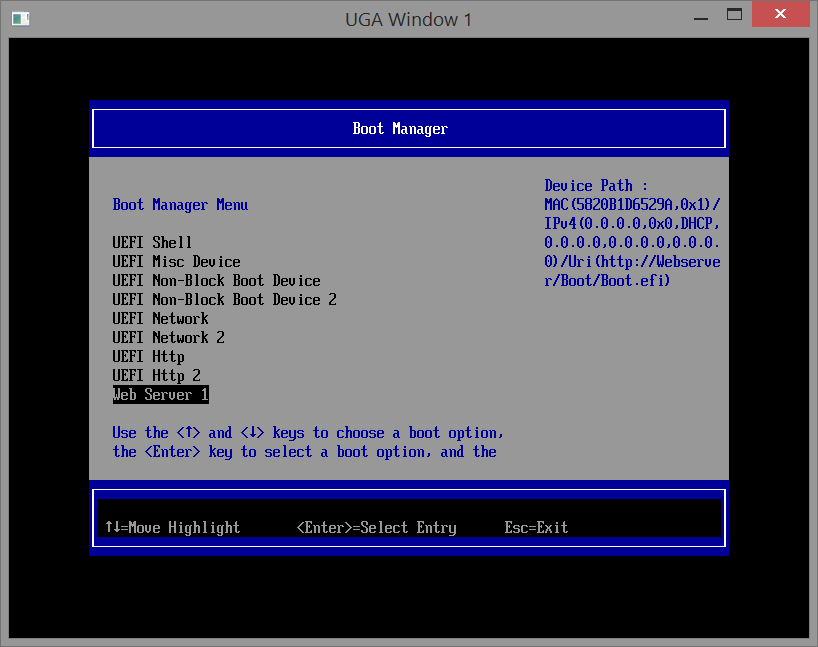-
Notifications
You must be signed in to change notification settings - Fork 344
NetworkPkg Getting Started Guide
- NetworkPkg/Ip6Dxe - Ip6 driver, which produces
EFI_IP6_PROTOCOL
EFI_IP6_CONFIG_PROTOCOL
- NetworkPkg/Udp6Dxe - Udp6 driver, which produces
EFI_UDP6_PROTOCOL
- NetworkPkg/TcpDxe - TCP combo driver, which produces
EFI_TCP4_PROTOCOL
EFI_TCP6_PROTOCOL
Note: There are two TCP drivers in EDK II, either Tcp4Dxe or TcpDxe could be used, but they should not be used at the same time.
- NetworkPkg/Dhcp6Dxe - DHCP6 driver, which produces
EFI_DHCP6_PROTOCOL
- NetworkPkg/Mtftp6Dxe - MTFTP6 driver, which produces
EFI_MTFTP6_PROTOCOL
- NetworkPkg/IpSecDxe - Ipsec driver, which produces
EFI_IPSEC2_PROTOCOL
EFI_IPSEC_CONFIG_PROTOCOL
- Supported features in IPsec:
- Security Protocols: Encapsulating Security Payload (ESP)
- IPsec Mode: Transport/Tunnel mode
- Encryption Algorithm: 3DES-CBC, AES-CBC
- Authentication Algorithm: HMAC_SHA1_96
- Authentication Method: Pre-shared Key, X509 Certificates
- After IPsec is enabled in both side, all inbound and outbound IP packet are processed by IPsec.
- NetworkPkg/UefiPxeBcDxe - PXE driver, which produces
EFI_LOAD_FILE_PROTOCOL
EFI_PXE_BASE_CODE_PROTOCOL
Note: this driver supports both IPv4 and IPv6 network stack, and can't co-work with the UefiPxeBcDxe driver in MdeModulePkg.
- NetworkPkg/IScsiDxe - iSCSi driver, which produces
EFI_ISCSI_INITIATOR_NAME_PROTOCOL
EFI_EXT_SCSI_PASS_THRU_PROTOCOL
EFI_AUTHENTICATION_INFO_PROTOCOL
Note: this driver supports both IPv4 and IPv6 network stack, and can't co-work with the IScsiDxe driver in MdeModulePkg.
- NetworkPkg/DnsDxe - DNS driver, which produces
EFI_DNS4_PROTOCOL
EFI_DNS6_PROTOCOL
- NetworkPkg/HttpDxe - HTTP driver, which produces
EFI_HTTP_PROTOCOL
- NetworkPkg/HttpUtilitiesDxe - HTTP utilities driver, which produces
EFI_HTTP_UTILITIES_PROTOCOL
- NetworkPkg/HttpBootDxe - HTTP Boot driver, which produces
EFI_LOAD_FILE_PROTOCOL
- Application/VConfig - VLAN configuration Shell application
- Application/IpsecConfig - IPsec configuration Shell application
- Application/Ping6 - Ping6 has been integrated to Shell Spec 2.2, please use the command in ShellPkg.
- Application/Ifconfig6 - IfConfig6 has been integrated to Shell Spec 2.2, please use the command in ShellPkg.
- UNDI, SNP, DPC and MNP drivers are components shared by IPv4 network stack and IPv6 network stack. These modules could be found in MdeModulePkg except the UNDI driver. For UNDI driver, please contact the Card Vendor.
[Defines]
DEFINE NETWORK_ENABLE = TRUE
DEFINE NETWORK_IP6_ENABLE = TRUE
DEFINE NETWORK_ISCSI_ENABLE = TRUE
DEFINE NETWORK_VLAN_ENABLE = TRUE
DEFINE NETWORK_HTTP_BOOT_ENABLE = TRUE
DEFINE NETWORK_IPSEC_ENABLE = TRUE
[LibraryClasses]
DpcLib|MdeModulePkg/Library/DxeDpcLib/DxeDpcLib.inf
NetLib|MdeModulePkg/Library/DxeNetLib/DxeNetLib.inf
IpIoLib|MdeModulePkg/Library/DxeIpIoLib/DxeIpIoLib.inf
UdpIoLib|MdeModulePkg/Library/DxeUdpIoLib/DxeUdpIoLib.inf
TcpIoLib|MdeModulePkg/Library/DxeTcpIoLib/DxeTcpIoLib.inf
HttpLib|MdeModulePkg/Library/DxeHttpLib/DxeHttpLib.inf
IntrinsicLib|CryptoPkg/Library/IntrinsicLib/IntrinsicLib.inf
OpensslLib|CryptoPkg/Library/OpensslLib/OpensslLib.inf
BaseCryptLib|CryptoPkg/Library/BaseCryptLib/BaseCryptLib.inf
OpensslTlsLib|CryptoPkg/Library/OpensslLib/OpensslTlsLib.inf
TlsLib|CryptoPkg/Library/TlsLib/TlsLib.inf
[Components]
!if $(NETWORK_ENABLE) == TRUE
MdeModulePkg/Universal/Network/DpcDxe/DpcDxe.inf
MdeModulePkg/Universal/Network/SnpDxe/SnpDxe.inf
MdeModulePkg/Universal/Network/MnpDxe/MnpDxe.inf
MdeModulePkg/Universal/Network/ArpDxe/ArpDxe.inf
MdeModulePkg/Universal/Network/Dhcp4Dxe/Dhcp4Dxe.inf
MdeModulePkg/Universal/Network/Ip4Dxe/Ip4Dxe.inf
MdeModulePkg/Universal/Network/Mtftp4Dxe/Mtftp4Dxe.inf
MdeModulePkg/Universal/Network/Tcp4Dxe/Tcp4Dxe.inf
MdeModulePkg/Universal/Network/Udp4Dxe/Udp4Dxe.inf
!if $(NETWORK_IPSEC_ENABLE) == TRUE
NetworkPkg/IpSecDxe/IpSecDxe.inf
!endif
!if $(NETWORK_HTTP_BOOT_ENABLE) == TRUE
NetworkPkg/TlsDxe/TlsDxe.inf
NetworkPkg/DnsDxe/DnsDxe.inf
NetworkPkg/HttpDxe/HttpDxe.inf
NetworkPkg/HttpUtilitiesDxe/HttpUtilitiesDxe.inf
NetworkPkg/HttpBootDxe/HttpBootDxe.inf
!endif
!if $(NETWORK_IP6_ENABLE) == TRUE
NetworkPkg/Ip6Dxe/Ip6Dxe.inf
NetworkPkg/Dhcp6Dxe/Dhcp6Dxe.inf
NetworkPkg/TcpDxe/TcpDxe.inf
NetworkPkg/Udp6Dxe/Udp6Dxe.inf
NetworkPkg/Mtftp6Dxe/Mtftp6Dxe.inf
!endif
!if $(NETWORK_IP6_ENABLE) == TRUE
NetworkPkg/UefiPxeBcDxe/UefiPxeBcDxe.inf
!else
MdeModulePkg/Universal/Network/UefiPxeBcDxe/UefiPxeBcDxe.inf
!endif
!if $(NETWORK_ISCSI_ENABLE) == TRUE
!if $(NETWORK_IP6_ENABLE) == TRUE
NetworkPkg/IScsiDxe/IScsiDxe.inf
!else
MdeModulePkg/Universal/Network/IScsiDxe/IScsiDxe.inf
!endif
!endif
!if $(NETWORK_VLAN_ENABLE) == TRUE
MdeModulePkg/Universal/Network/VlanConfigDxe/VlanConfigDxe.inf
!endif
!endif
!if $(NETWORK_ENABLE) == TRUE
INF MdeModulePkg/Universal/Network/SnpDxe/SnpDxe.inf
INF MdeModulePkg/Universal/Network/DpcDxe/DpcDxe.inf
INF MdeModulePkg/Universal/Network/MnpDxe/MnpDxe.inf
INF MdeModulePkg/Universal/Network/ArpDxe/ArpDxe.inf
INF MdeModulePkg/Universal/Network/Ip4Dxe/Ip4Dxe.inf
INF MdeModulePkg/Universal/Network/Udp4Dxe/Udp4Dxe.inf
INF MdeModulePkg/Universal/Network/Dhcp4Dxe/Dhcp4Dxe.inf
INF MdeModulePkg/Universal/Network/Mtftp4Dxe/Mtftp4Dxe.inf
!if $(NETWORK_IPSEC_ENABLE) == TRUE
INF NetworkPkg/IpSecDxe/IpSecDxe.inf
!endif
!if $(NETWORK_IP6_ENABLE) == TRUE
INF NetworkPkg/Ip6Dxe/Ip6Dxe.inf
INF NetworkPkg/Dhcp6Dxe/Dhcp6Dxe.inf
INF NetworkPkg/Udp6Dxe/Udp6Dxe.inf
INF NetworkPkg/Mtftp6Dxe/Mtftp6Dxe.inf
!endif
!if $(NETWORK_HTTP_BOOT_ENABLE) == TRUE
INF NetworkPkg/DnsDxe/DnsDxe.inf
INF NetworkPkg/TlsDxe/TlsDxe.inf
INF NetworkPkg/HttpDxe/HttpDxe.inf
INF NetworkPkg/HttpUtilitiesDxe/HttpUtilitiesDxe.inf
INF NetworkPkg/HttpBootDxe/HttpBootDxe.inf
!endif
!if $(NETWORK_IP6_ENABLE) == TRUE
INF NetworkPkg/UefiPxeBcDxe/UefiPxeBcDxe.inf
INF NetworkPkg/TcpDxe/TcpDxe.inf
!else
INF MdeModulePkg/Universal/Network/UefiPxeBcDxe/UefiPxeBcDxe.inf
INF MdeModulePkg/Universal/Network/Tcp4Dxe/Tcp4Dxe.inf
!endif
!if $(NETWORK_VLAN_ENABLE) == TRUE
INF MdeModulePkg/Universal/Network/VlanConfigDxe/VlanConfigDxe.inf
!endif
!if $(NETWORK_ISCSI_ENABLE) == TRUE
!if $(NETWORK_IP6_ENABLE) == TRUE
INF NetworkPkg/IScsiDxe/IScsiDxe.inf
!else
INF MdeModulePkg/Universal/Network/IScsiDxe/IScsiDxe.inf
!endif
!endif
!endif
To validate network stack on NT32 platform, please refer to the document UEFI Network Stack for EDK Getting Started Guide to build the SnpNt32Io dynamic library.
For detailed description on UEFI HTTP Boot, see the "HTTP Boot" section in UEFI Specification.
Please refer to the white paper EDK II HTTP Boot Getting Started Guide for a step by step guide of the HTTP Boot enabling and server configuration in corporate environment.
Besides the standard DHCP parameters like the station IP, gateway and DNS server address, the EDK II HTTP Boot driver will use below extensions assigned by DHCP server in corporate environment.
| Tag Name | Tag # (DHCPv4) | Tag # (DHCPv6) | Length | Data Field |
|---|---|---|---|---|
| Boot File | 'file' field in DHCP header or option 67 | 59 | Varies | Boot File URI String (eg. "http://Webserver/Boot/Boot.efi") |
| Class Identifier | 60 | 16 | 10 | "HTTPClient" |
Unlike the corporate network, in a typical home network only a standard DHCP server is available for host IP configuration assignment, the boot file URI need to be entered by user instead of the DHCP HTTPBoot extensions.

EDK II HTTP Boot driver provides a configuration page for the boot file URI setup.
- In the main page of Boot Manager Menu, enter [Device Manager] -> [Network Device List] -> Select a NIC device -> [HTTP Boot Configuration], set the HTTP boot parameters such as the boot option title, IP start version and the URI address as below.
- Save the configuration and back to the main page, enter [Boot Manager] menu as below, select the new created boot option to start the HTTP Boot.
- To delete the boot option, enter [Boot Maintenance Manager] -> [Boot Options] -> [Delete Boot Option].
Besides the UEFI formatted executable image, the downloaded boot file could also be an archive file (hard disk image) or an ISO image. The file should contain an UEFI-compliant file system and will be mounted as a RAM disk by HTTP Boot driver, to be proceeded in the subsequent boot process.
In EDKII HTTP Boot driver, the image type is identified by the filename extensions as below.
| Filename Extensions | Image Type |
|---|---|
| *.iso | Virtual CD Image |
| *.img | Virtual Disk Image |
| Others (typically *.efi) | UEFI Executable Image |
To enable the RAM Disk boot support, the RamDiskDxe driver and the UefiBootManagerLib (commit b1bb6f5) are also required.
[LibraryClasses]
UefiBootManagerLib|MdeModulePkg/Library/UefiBootManagerLib/UefiBootManagerLib.inf
[Components]
MdeModulePkg/Universal/Disk/RamDiskDxe/RamDiskDxe.inf
Home
Getting Started with EDK II
Build Instructions
EDK II Platforms
EDK II Documents
EDK II Release Planning
Reporting Issues
Reporting Security Issues
Community Information
Inclusive Language
Additional Projects & Tasks
Training
Community Support
Community Virtual Meetings
GHSA GitHub Security Advisories Proceess (Draft)

